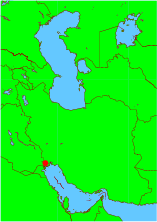Abadan
2008/9 Schools Wikipedia Selection. Related subjects: Geography of the Middle East
- Abadan (film) is also the name of a 2003 Iranian movie from director Mani Haghighi, as well as the name of a town in Turkmenistan
Abadan ( Persian: آبادان) is a city in the Khuzestan province in southwestern Iran (Persia). It lies on Abadan Island (68 km long, 3-19 km wide, the island is bounded in the west by the Arvand River and to the east by the Bahmanshir outlet of the Karun River), on the Arvand river 53 kilometers from the Persian Gulf, near the Iraqi-Iran border. It is the capital of Abadan County. In 2005, the population was estimated to be at 415,139. The civilian population of the city dropped to near zero during the eight-years Iran-Iraq war. In 1992, only 84,774 had returned to live in the city. By 2001, the population had jumped to 206,073, only to double in the past five years.
Etymology
Beladori (d. 892) quotes the story that the town was founded by 'Abbad bin Hosayn Khabethi, who established a garrison there during the governorship of Hajjaj in the Ummayad period. An Iranian etymology of the name (from the Persian word "ab" (water) and the root "pā" (guard, watch) thus "coastguard station"), was suggested by B. Farahvashi. Supporting evidence is the name "Apphana" which Ptolemy applies to an island off the mouth of the Tigris. The Persian version of the name had begun to come into general use before it was adopted by official decree in 1935. The geographer Marcian also renders the name "Apphadana" in his writings.
History
Abadan is thought to have originally developed as a port city under the Abbasids' rule. Legendarily, it was founded by a holy man, 'Abbad. In this time period, it was a commercial source of salt and woven mats. The siltation of the river delta forced the town further away from water; Ibn Battutah described Abadan as a small city in a flat salty plain. Politically, Abadan was often the subject of dispute between the nearby states; in 1847, Persia acquired it, in which state Abadan has remained since. From the 17th century onward, the island of Abadan was part of the lands of the Arab Ka'ab ( Bani Kaab) tribe. One section of this tribe, Mohaysen, had its headquarters at Mohammara(present-day Khorramshahr), until the removal of Shaikh Khaz'al Khan in 1924.
It was not until the 20th century that rich oil fields were discovered in the area. In 1910, the population had been around 400. The Anglo-Persian Oil Company built their first pipeline terminus oil refinery in Abadan, starting in 1909 and completing it in 1913. By 1938, it was the largest in the world. To this day it remains a vast facility for refining petroleum. The facilities necessitated an equally vast population: more than 220,000 people in 1956.
Only a low 9% of managers (of the oil company) were from Khuzestan. The proportion of natives of Tehran, the Caspian, Azarbaijan and Kurdistan rose from 4% of blue collar workers to 22% of white collar workers to 45% of managers. Thus while Arabic speakers were concentrated on the lower rungs of the work force, managers tended to be brought in from some distance.
On August 19, 1978-the anniversary of the US backed pro-Shah coup d'etat which overthrew the nationalists and popular Iranian prime minister, Dr. Mohammed Mossadegh — the Cinema Rex, a movie theatre in Abadan, Iran, was set ablaze by four Islamic Revolution sympathizers in an attempt to help the cause of Iran's Islamic Revolution. The local Abadan police had taken notice, and became suspicious of Hossein Takbali-zadeh and his accomplices, and had started following the arsonists as they were entering Cinema Rex. The police decided to continue their surveillance and track the group after they left the movie theatre. This incident ended up causing the Cinema Rex Fire, where over 350 people perished. At the trial, Hossein Takbali-zadeh stated that his three accomplices by the names of Faraj, Falah, and Yadollah had all burned in the fire.
In September 1980, Abadan was almost overrun during a surprise attack on Khuzestan by Iraq, marking the beginning of the Iran-Iraq War. For 18 months Abadan was besieged, but never captured, by Iraqi forces. Much of the city, including the oil refinery which was the world's largest refinery with capacity of 680,000 barrels per day, was badly damaged or destroyed by the siege and by bombing. Previous to the war, the city's civilian population was about 300,000, but before it was over, most of the populous had sought refuge elsewhere in Iran.
After the war, the biggest concern was the rebuilding of Abadan's oil refinery. In 1993, the refinery began limited operation & and the port reopened. By 1997, the refinery reached the same rate of production it was at before the war.
Recent events
To honour the 100th anniversary of the refining of oil in Abadan, city officials are planning an "oil museum"
Places of interest
The Abadan Institute of Technology was established in Abadan in 1939. The school specialized in engineering and petroleum chemistry, and was designed to train staff for the refinery in town. The school's name has since changed several times, but since 1989 has been considered a branch campus of the Petroleum University of Technology, centered in Tehran.
There is an international airport in Abadan. It is represented by the IATA airport code ABD.
Trivia
- The Abadan oil refinery was featured on the reverse side of Iran's 100-rial banknotes printed in 1965 and from 1971 to 1973.




